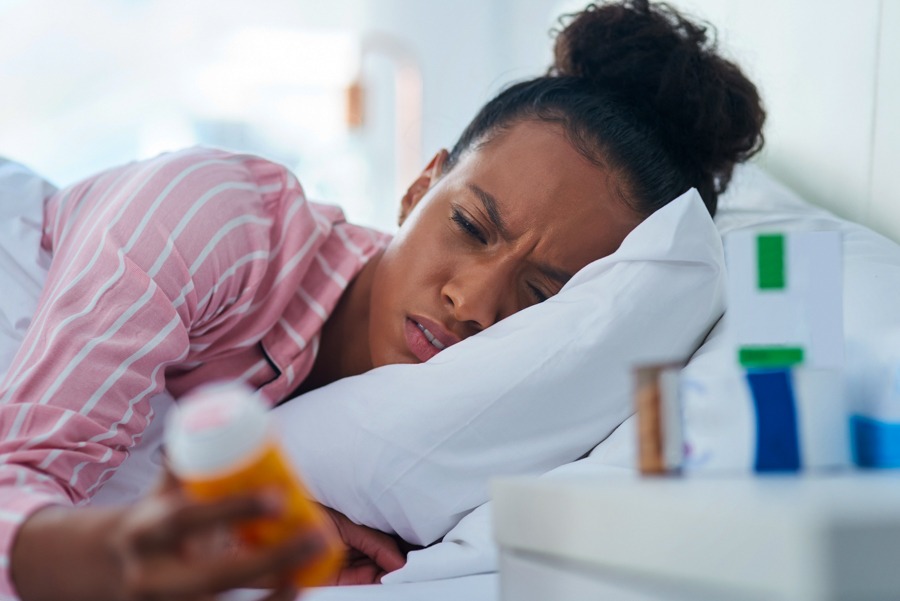The simple answer to “Does alcohol make you sleepy?” is yes. However, the true answer to this question is so much more than a simple yes. How and why alcohol affects sleeping patterns comes down to detrimental physiological and physical impacts. The hows and whys of these negative health effects may be the motivation you need to overcome your addiction struggle.
Why Does Alcohol Affect Sleep?
How does alcohol make you sleepy? Scientifically, alcohol affects your sleep in multiple ways. It acts as a depressant, initially making you feel drowsy, but its effects can disrupt your overall sleep quality, leading to a domino effect that impacts your energy and focus the next day. These sleep disruptions can occur no matter how much alcohol you consume.
Since alcohol is a depressant, this means it slows down neuronic response, thus resulting in a relaxing state. This state of relaxation can be so neurologically suppressive that it induces drowsiness, especially when indulged in large quantities. When alcohol is consumed at an excessive rate, it can even induce coma. This outcome often coincides with some form of alcohol poisoning.
It would be false to believe that since alcohol is a depressant, it will help you sleep well. On the contrary, alcohol is a known inhibitor of REM sleep, the body’s deepest state of relaxation and restoration. Compoundingly, alcohol consumption increases how much time your body spends in the lighter phases of sleep. This is why you will experience a deep state of drowsiness upon waking up following an evening of drinking.
Alcohol is widely documented to increase nightmarish dreams when you sleep. The likelihood of these tremors crescendos throughout the night as more alcohol is processed and expelled from the body. In correlation, the more you drink, the greater the chance of nightmares occurring. This can further lead to restless evenings due to tremor-induced sleep disruptions.
As hinted at in the previous point, drinking can cause restlessness and persistent wakefulness throughout the night. Whether by nightmares, overactive bladder, or simply alcohol-caused wakings, broken sleep patterns usually accompany a day or evening of drinking.
While broken sleep patterns are a part of alcohol’s short-term effects, It can also be a permanent consequence with prolonged use. Insomnia is a mental health condition characterized by a complete inability to sleep or stay asleep. Over time, alcohol consumption is a known accelerant to causing this and many other mental health conditions. Once acquired, it is nearly impossible to reverse without accomplishing a full-proof medical detox.
Melatonin is a naturally produced hormone your body releases to induce a natural night’s sleep. The scientific reason alcohol affects sleep is found in recent studies that suggest alcohol inhibits the amount of melatonin your body releases. You can restore your natural melatonin levels by reaching out to our dedicated team of therapists. We can help you reverse the negative effects of alcohol and restore your natural melatonin levels for a better night’s sleep.
What are the Dangers of Sleeping After Drinking?
Many people mistakenly think that the best way to recover after a night of drinking is to simply sleep it off. However, depending on how much you’ve consumed and how much time has passed, this may not be true. It’s important to be aware of the dangers related to alcohol intake and how long it’s been since your last drink.
Even if you haven’t overconsumed, your blood alcohol levels continue to rise if you fall asleep too soon after drinking. Sleeping too soon after drinking causes an escalation in blood pressure, body temperature, and other bodily effects. These coexisting factors exacerbate the alcohol content in your blood. The most dangerous part is the risk of dying of alcohol poisoning in your sleep without seeing a doctor.
Alcohol soaks up all the water content in your body, resulting in dehydration. These dehydrated effects are exacerbated during sleep as your body processes the alcohol. This is one of the additional reasons blood/alcohol content continues to rise after falling asleep. As your organs soak up the water in your body to process alcohol, dehydration and drunkenness increase. Severe dehydration under these circumstances
Excessive alcohol consumption can trigger the regurgitation reflex, increasing the risk of choking on vomit during sleep. Tragically, this has led to fatalities. To reduce this danger, it’s crucial to take precautions, such as sleeping on your stomach or pacing your drinking earlier in the day, to prevent such life-threatening situations.
Sleep Apnea is a disorder that causes a blockage, constriction, or obstructed airway that prevents normal breathing patterns during sleep. When you fall asleep, the muscle responsible for this airway slackens naturally. However, due to the increased depressive effects of alcohol on the nervous system, it can become overly loosened. This overcompensating slackness restricts the airway, causing irregular or reduced breathing. The degree of this collapsed airway varies per individual case and severity. In the most severe cases, it can cause one to suffocate to death.
The most overlooked danger of sleeping after drinking is the direct effects on your priorities the following day. These effects consist of being late or not showing up for work, failing work and school responsibilities, and other priorities. This can result in poor grades or, over time, getting fired from your job.
Which Sleeping Abnormalities are a Sign of a Drinking Problem?
While excessive sleeping is a sign of a drinking problem, numerous sleep abnormalities are indicative of alcoholism. These abnormalities can be classified into any of the following disorders or characteristics.
Hypersomnia
Hypersomnia is characterized by abnormal daytime tiredness or excessive daytime sleep. If you possess persistent tiredness that lasts from the moment you wake up and persists throughout the day, you may have alcoholism. The same can be said if you sleep long hours throughout the day and late afternoon. Seek professional help and treatment assessment if you drink and this describes you.
Insomnia
Insomnia is both a side effect and a red flag of alcoholism. Unlike hypersomnia, insomnia is an utter inability to fall asleep at any time of the day or night. If you struggle falling asleep in conjunction with a drinking problem, rest assured there’s hope for you. Crestview Recovery has all the first-rate treatment programs and detox specialists to help expunge the cravings from your body. You’ll finally get the deep sleep you’ve always wanted thanks to our dedication to your sobriety.
Delayed Sleep Onset
Laying in bed for long hours trying to fall asleep to no avail is indicative of a drinking problem. One of the most common characteristics of alcoholism is delayed sleep onset. If you’re a drinker finding it hard to fall asleep regardless of excessive tiredness, seek immediate medical assistance. Our personalized treatment programs can help you overcome these sleep abnormalities.
How Do You Counteract Alcohol-Induced Sleep Disruptions?
If you continue to have disrupted sleep cycles in conjunction with drinking, there are some methods to help counteract it. While some may be obvious, the keys to be mentioned are the only way to avoid continued broken sleep patterns.
Stay Hydrated
Alcohol may give you the impression that there’s no room for any other drink. However, having a little more water to counteract alcohol’s dehydrating effects will help your body metabolize it faster. Yes, it may dilute the effects of alcohol, considering drinking relies heavily on its dehydration factors to magnify drunken effects. Yet, it may be worth it to vilify sleeping problems later in the night. Again, it won’t resolve all your sleeping problems, but it’ll help.
Quit Drinking
The hardest, yet most obvious way to resolve alcohol-caused inhibited sleep patterns is to stop drinking completely. However, it is important not to attempt to do so alone. Depending on your body’s level of dependency, self-attempting alcohol cessation could do serious harm to your mind and body. It takes the proper administration and guidance from a treatment professional to detox and properly recover from alcohol dependency. Reach out to a professional at Crestview Recovery to learn how we can help you achieve sobriety and get the best night’s sleep you’ve ever had.
Crestview Recovery in Portland Has the Treatment Solutions to Your Addiction Struggles

Does alcohol make you sleepy and prevent you from being the best you the next day? If the answer is yes, Crestview recovery has all the tools to bring out the best in your personal struggle. We use the word personal often because we know not all treatment is created equal. Every struggle requires a unique approach with a different set of goals and rehab methods. That’s why we embed a unique and personalized approach in all of our individual, group, residential, and aftercare programs. Our attentively compassionate specialists make your needs our priority by listening to you and meticulously charting out a recovery path that’s made just for you.
































